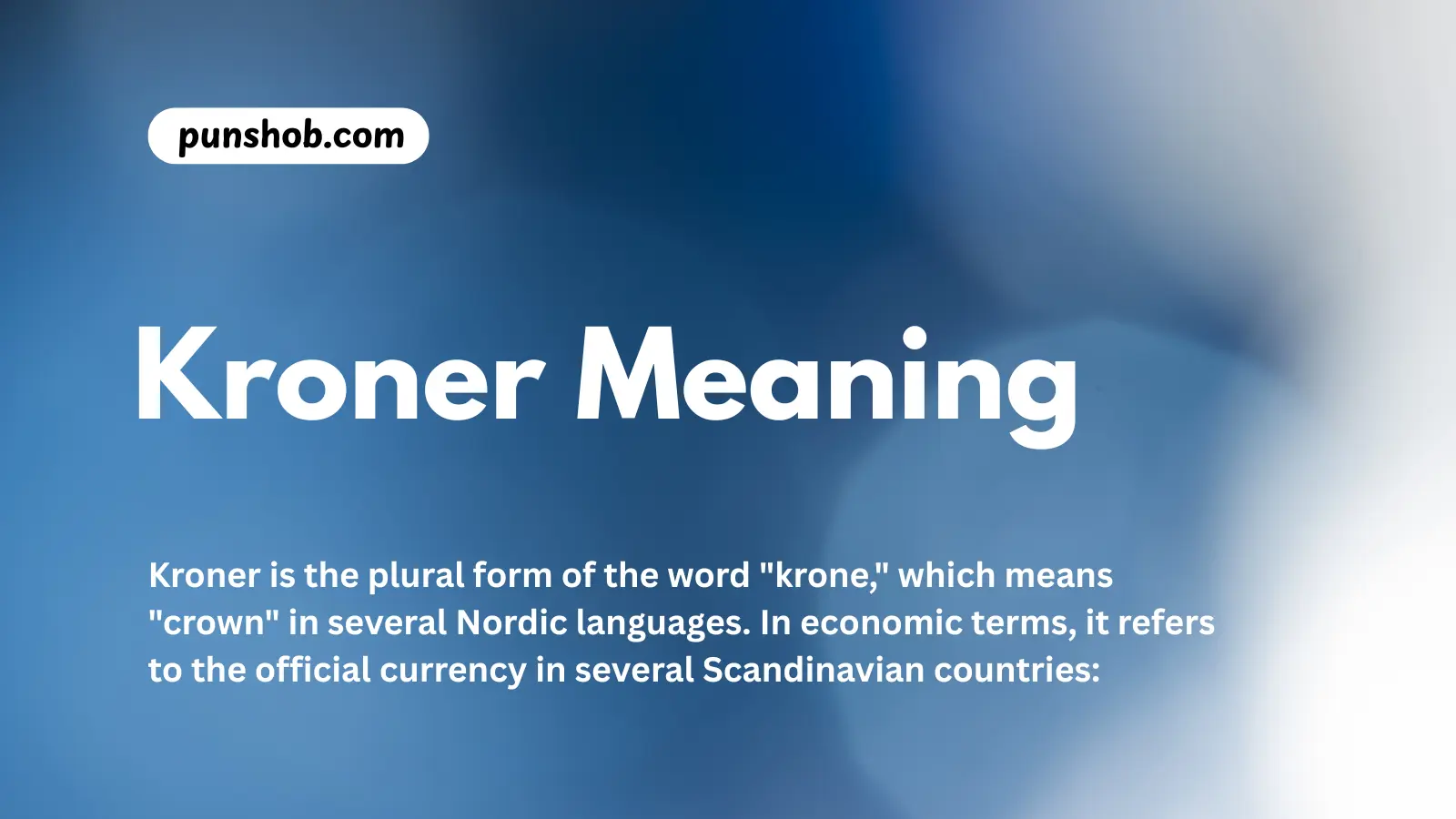Understanding currency terms can feel like diving into a whole new language. One such term is “kroner,” a word used in several European nations, especially in Scandinavia. But what exactly does “kroner” mean? Does it have uses beyond just financial contexts? And how can it appear in modern-day texting, polite communication, or casual settings?
This complete and user-friendly article breaks down the full meaning of “kroner”, its relevance in different contexts, how it shows up in text messages, and even how it connects with the word “hiatus.” Along the way, you’ll find professional, polite, and informal ways to use related expressions—with 11 examples for your practical understanding.
Let’s explore everything you need to know about kroner, and how you can use similar expressions smartly.
💱 What Does Kroner Mean?
Kroner is the plural form of the word “krone,” which means “crown” in several Nordic languages. In economic terms, it refers to the official currency in several Scandinavian countries:
- Norwegian Krone (NOK) — Used in Norway
- Danish Krone (DKK) — Used in Denmark
- Icelandic Króna (ISK) — A variation of the same word used in Iceland
So, when you hear “kroner,” think of money or currency, specifically related to these regions.
For example:
“The total cost of the dinner was 1,200 kroner.”
Here, “kroner” clearly stands for money, much like “dollars” or “euros.”
📝 Kroner Meaning in Text
In casual messaging or digital conversations, you might see the word “kroner” being referenced in the context of pricing, travel, budgeting, or shopping in Scandinavian countries.
For example:
Friend A: “How much was the jacket in Oslo?”
Friend B: “About 900 kroner.”
Here, “kroner” is simply used like any other currency name. There’s no slang variation or hidden meaning; it’s used literally.
However, sometimes in informal conversations, people might abbreviate the currency name:
- “NOK” instead of “Norwegian kroner”
- “DKK” for Danish krone
But “kroner” remains a common and understandable term in international contexts.
Read Also: XD Meaning in Text: What It Really Stands For & When to Use It 2025
🧠 Is There a Connection Between Hiatus and Kroner?
While “kroner” refers to currency, “hiatus” is completely different—it means a pause, break, or gap in a process or time period.
What is Hiatus?
“Hiatus” is used when someone takes a temporary break from work, social media, or any activity.
For example:
“She took a hiatus from school to travel.”
There’s no direct link between kroner and hiatus, but they might appear in the same sentence like this:
“I took a hiatus from work and traveled across Norway, spending around 10,000 kroner on the trip.”
In this case, both words are used in their proper meanings: hiatus for break and kroner for money.
Read Also: DTF Meaning in Text: Understanding Its Meaning, Use, and Alternative Expressions 2025
✍️ Alternative Ways to Say Hiatus (11 Expressions with Meaning and Usage)
Depending on tone and context, you can use many alternatives to “hiatus” in both formal and casual settings. These expressions help convey the same idea of taking a pause or break.
1. Break
- Meaning: A short rest or pause
- Example: “I’m taking a break from my usual routine.”
2. Time off
- Meaning: Period away from work or duties
- Example: “He’s taking some time off to recharge.”
3. Leave of absence
- Meaning: An official period away from work or study
- Example: “She was granted a leave of absence for health reasons.”
4. Sabbatical
- Meaning: A long break, especially for academic or personal development
- Example: “He’s on a sabbatical to write his next book.”
5. Pause
- Meaning: A temporary stop
- Example: “We’re putting the project on pause.”
6. Intermission
- Meaning: A short break, especially in performance or event
- Example: “Let’s discuss after the intermission.”
7. Recess
- Meaning: A scheduled break (school, legal proceedings)
- Example: “Court is in recess until next week.”
8. Downtime
- Meaning: A relaxing break from activity
- Example: “I need some downtime after that hectic week.”
9. Rest period
- Meaning: A time set aside for relaxation
- Example: “Doctors recommend a rest period for full recovery.”
10. Cool-off period
- Meaning: Time to step back and reflect
- Example: “They agreed to a cool-off period after the argument.”
11. Retreat
- Meaning: A withdrawal for rest or spiritual renewal
- Example: “She’s attending a retreat to reflect and relax.”
📢 Choosing the Right Word: Tone and Context Matter
While all of the above terms can mean “hiatus” in one way or another, choosing the right term depends on who you’re talking to and what you’re talking about.
| Context | Recommended Word |
|---|---|
| Formal workplace | Leave of absence, sabbatical |
| Casual texting | Break, time off, downtime |
| Health or stress | Rest period, cool-off |
| Creative or academic pause | Sabbatical, retreat |
Example:
- Casual: “Taking a break from Insta 😌”
- Formal: “I’m on a sabbatical to focus on research.”
This nuance keeps your language appropriate and clear.
💬 Kroner in Real-Life Sentences
To make things even clearer, here are a few realistic examples of how “kroner” can be used:
- “The meal cost around 500 kroner in Bergen.”
- “We exchanged dollars for Danish kroner at the airport.”
- “I budgeted 10,000 kroner for the trip.”
- “That coat was ridiculously priced—like 2,300 kroner!”
- “She saved up 50,000 kroner before moving abroad.”
- “I only had a few kroner left after shopping.”
- “Prices in Norway are usually in kroner, not euros.”
- “Can you lend me 200 kroner until tomorrow?”
- “He converted all his savings into kroner.”
- “They offer student discounts in kroner, too.”
- “We paid the taxi fare in Norwegian kroner.”
These examples show everyday usage of “kroner” with correct tone and context.
🔍 FAQs About “Kroner” and Related Phrases
What is the singular of kroner?
Answer: The singular form is “krone.” “Kroner” is the plural.
Which countries use kroner?
Answer: Norway, Denmark, and Iceland (as “króna”) use versions of the krone.
Is kroner still in use today?
Answer: Yes, it’s still the official currency in these countries.
What does “hiatus” mean?
Answer: It means a break or temporary pause in activity.
Is “hiatus” used in texting?
Answer: Yes, people say things like “on hiatus” or “taking a break.”
Can kroner be used in other countries?
Answer: Usually no—kroner is used within the issuing country unless exchanged.
Is “kroner” a slang term?
Answer: No, it’s a formal word for currency, not slang.
🏁 Conclusion
Whether you’re traveling through Denmark or chatting with friends about your Scandinavian adventure, understanding the meaning of “kroner” helps you communicate clearly and confidently. While it’s a straightforward currency term, pairing it with correct context—especially when discussing breaks or budgeting—makes a difference.
Alongside it, understanding alternatives to “hiatus” ensures you’re using the right tone whether you’re texting your boss or relaxing with a friend.
So next time you hear “kroner” or “hiatus,” you’ll know exactly what they mean, how they’re used, and what expressions to swap in when you want to sound just right.












Leave a Reply